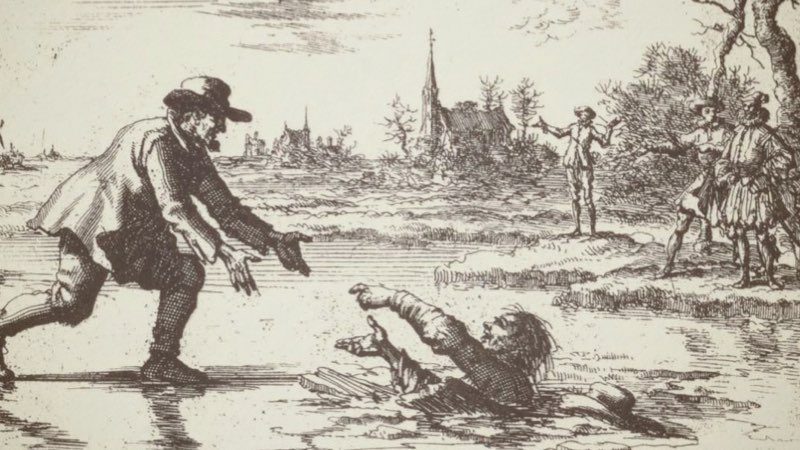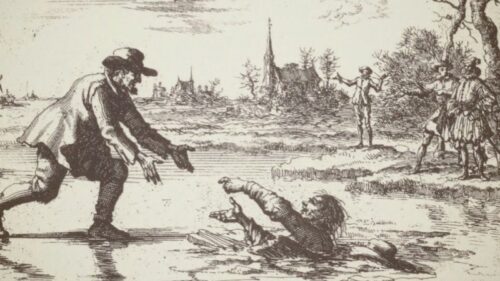
4. Of the Church’s Characteristics
Of the Stability, Durability and Visible Characteristics of the Church of God
That this church, from the beginning to the time of David, was always visible, discernible, and distinguished from other nations, is clear and manifest, and, as far as we know, not doubted by anybody. There remains, then, only to be proved, that the same after the time of David, has always been discernible, according to the preceding manner, and will continue to be so to the end. [The discernibility of the church of God before the time of David, will, we think, not be disputed; and we shall begin, therefore, from that period, leaving the time previous to that untouched.]
To show this, the song of David of the city or church of God, Ps. 46:3,4, serves an excellent purpose. “Though the sea rage and roll, so that through its tempest the mountains fall in, Selah! the city of God shall nevertheless remain glad with her fountains, where the holy tabernacles of the Almighty are.” This passage, beginning with the preceding verse reads as follows according to the original text: “Therefore will not we fear, though the earth be removed, and though the mountains be carried into the midst of the sea; though the waters thereof roar and be troubled, though the mountains shake with the swelling thereof, Selah. There is a river, the streams whereof shall make glad the city of God, the holy place of the tabernacles of the Most High. God is in the midst of her; she shall not be moved: God shall help her, and that right early.” [The swelling sea and the tempests of which David speaks here, must not be understood as having reference to elemental water, or a disturbance of the natural, created things; but to the onset of the evil practices and doctrines of evil-minded and ungodly men, through the wiles of Satan, the hellish adversary. The removing of the earth and the displacing or falling in of the mountains through the aforesaid tempests may be understood to refer to the ruin and destruction of the earthly-minded and great of this world, who perish through the noxious waters and commotions of evil doctrines. The streams which make glad the city of God, can very properly be applied as having reference to the saving doctrines through which the city or church of God is refreshed, gladdened, and through the divine promises contained in His word made to rejoice in the Spirit.]
Who is there so ill versed in the Word of God, as to suppose that he is to understand by the words city of God and the holy place of the tabernacles of the Most High, etc., the city of Jerusalem in the land of Palestine, and the Temple which was built in that city? for this city and the Temple which was in it, were laid waste and totally demolished and destroyed, first by the Chaldeans, in the time of Jeremiah, and subsequently by the Romans, who conquered the land of Canaan and Jerusalem; so that, according to the prophecy of Christ, not one stone was left upon another. We must, therefore, understand this as relating to the church of God, which is called, in holy Scriptures, the city of God. Heb. 12:22; for of the same it is said that God is in the midst of her, and that, therefore, she shall not be moved, etc., as shall appear more fully from the following testimonies, Isaiah 2:2: “And it shall come to pass in the last days, that the mountains [The mountain of which Isaiah says that the house of the Lord is built upon, must necessarily be understood as referring to Christ who in the language of the prophets, is called a mountain in holy Scripture. Dan. 2:35. On the other hand, the house which Solomon built upon Mount Moriah, has been destroyed, and lain waste now for about 1600 years, without being rebuilt. But Christ is such a foundation, that whatever is truly built on it, cannot fall: for “Other foundation can no man lay than that is laid, which is Jesus Christ” (I Cor 3:11).] of the Lord’s house shall be established . . . and all nations shall flow unto it.” It is beyond dispute that here, by the words the Lord’s house, we are to understand the church of the Lord, unless there be one who holds, with the Jews, that it must be understood as having reference to the house of stone, which, in former time, Solomon built, to the honor of God, on Mount Moriah; which house is now in ruins, but was to be rebuilt. But this cannot be expected, for the prophet Daniel, with respect to this desolation, says clearly that it shall be poured upon the desolate, even until the consummation (that is, the end of the world). Dan. 9:27 compared with Matt. 24:15.
No small proof of this is furnished by the fact that about forty years after the ascension of Christ, this very house was destroyed, demolished and burned by Titus Vespasian, and has not yet been rebuilt, though about sixteen hundred years have elapsed since; and, on account of the continual quarrels of the Palestinian and other eastern rulers, it is, viewing it from a human standpoint, not likely that it will ever be done. Since it is true, then, that by the words “the house of the Lord,” we must understand the church of the Lord, there follows also what is said in connection with it namely: that the same shall be firmly, i.e., invincibly, established on the mountain, that is, Christ, the immovable foundation.
Besides the adduced prophecy, Isaiah 2:2, showing the firmness and immovability of the house (or the church) of God, which is founded upon the mountain of the Lord—Christ Jesus—the same prophet treating of the durability, glory and divine dignity of this church, under the type of the New Jerusalem, produces various commendatory testimonies for this purpose, saying among other things, chap. 60, verse 11: “Thy gates shall be open continually; they shall not be shut day nor night.” This is a simile drawn from a peaceful city which has neither fear nor care that enemies will attack her, and, therefore, leaves her gates open by night as well as by day, for the accommodation of the citizens, and the messengers and strangers who are traveling in the night. Thus, he would say, will it also be with the future church of Jesus Christ. Then, in verse 14, speaking of the enemies of the church of God, and of those who had slandered her, he says: They “shall bow themselves down at the soles of thy feet; and they shall call thee, the city of the Lord, the Zion of the Holy One of Israel.” When a city has become so great that even her deadly enemies who had purposed to lay waste and destroy her, come bending their knees, and, as begging for favor, bow down before her, as is shown here of the enemies of the city and church of God; there is no probability that such city will easily be conquered, laid waste, or subjugated. So it is, in a spiritual sense, with the city and church of Jesus Christ; for it is this to which this prophecy has reference. Immediately after, in the fifteenth verse, the prophet declares that God will make this city or church an eternal excellency, a joy of many generations. And, as though by this the durability and excellency of this city, well-beloved of God, were not yet sufficiently expressed, he adds these words, verse 19: “But the Lord shall be unto thee an everlasting light, and thy God thy glory.” And, lastly, verse 21: “Thy people, O God, also shall be all righteousness: they shall inherit the land forever.” Here no further explanation is required, since the text plainly and clearly expresses our meaning; and we will, therefore let it suffice.
We then proceed to what Christ, the Son of God, Himself testifies concerning this matter. Matt. 16:18: “Upon this rock I will build my church; and the gates of hell shall not prevail against it.” Christ, in another place, speaking by parable of a man who built his house upon the sand, adds the explanation: that the same was a foolish man; because such a foundation, and, therefore, also the building which is founded upon it, cannot stand before the floods, rains, and storms, which beat against it. On the other hand, He commends him as wise and prudent, who built his house upon a rock; since the same, being well-founded, is able to withstand all dangers. But the foundation of which the Lord speaks here, that He will build His church upon it, is much firmer than any material rock, for these must all pass away with time; but the foundation which is Christ Himself, remains, shall remain, and shall never decay: for “the foundation of God standeth sure” (2 Tim. 2:19). Yet not only the foundation, but also the building of the church shall not decay, though in nature it is otherwise; for a house, church, or tower, resting on an immovable foundation, but being not sufficiently firm or strong in itself, finally decays, yea falls to the ground; but here it stands so that no opposing agencies, not even the devil himself, can prevail against it, which is evident from these words: “And the gates of hell shall not prevail against it.” In or under the gates councils were wont to be held; and the gates were the strength and power of the cities. Compare Zech. 8:16 with Ps. 147:13. Hence, by the words, “The gates of hell,” etc., we are to understand the council and power of the hellish fiend. Yet, according to the last mentioned place of Scripture these shall not prevail against the church of Christ; [If Christ is so firm a foundation that not even the gates of hell can prevail against that which is built upon it, how very foolish careless and imprudent are they who forsake this foundation, and build upon, and trust in, the vain things of this world! Certainly everything under the sun, yea, all which our eyes behold, is vain and transitory. “Vanity of vanities, saith the preacher, . . . all is vanity” (Eccl. 1:2), understand: earthly things. But how much more vain are the sinful and evil things which God has forbidden, and concerning which He has warned us in His word, that we should have nothing to do with them! How great will be the fall of those who build upon these forbidden vanities! If we suffer damage, and complain, when a material house or building falls, because its foundation is not firm, how much greater loss will they sustain, and what greater reason will they have to lament, who will fall both in soul and body, without ever being able to rise again; and, consequently, no other opposing agencies; for these are the most powerful and worst enemies.
We pass on to other Scripture testimony written for the same purpose. Matt. 28:20: “And, lo, I am with you all the days, even unto the consummation of the ages.” Nearly all translators, in order to follow therein the Dutch way of speaking, render the last words of this sentence: “unto the end of the world.” But we have, for good reasons, preserved the Greek mode of expression, inasmuch as it serves better and more clearly to the end we have in view. For we have found that, after the common translation, the words, “unto the end of the world,” have been misinterpreted, and stretched beyond their meaning, by some inexperienced persons, so that these expound that which has been spoken of the consummation of time, as referring to the end of locality; even as though Christ had not here promised His apostles, to remain with them till all time should have come to an end; but only until, for the promulgation of the Gospel, they should have traveled unto the uttermost parts of the earth, which, because it is not possible to travel farther by land, are called the end of the world. This is a great error, for, according to his explanation, this promise would have belonged to the apostles alone, and been limited by their lifetime, since they traveled everywhere to preach, so that their sound went into all the earth, and their words unto the ends of the world. [The words of David, Ps. 19:6, which he spoke of the circuit of the sun around the whole earth every twenty-four hours, the apostle Paul applies to the traveling and preaching of the apostles through the whole world, saying, Rom. 10:18: “Verily their sound went into all the earth, and their words imto the ends of the world.” Since the apostles, in their time, traveled through the whole world, to preach the Gospel, and consequently, have been at the ends or uttermost limits of the earth, it would follow, according to our opponents’ own words, that the promise of Christ, “Lo, I am with you”), etc., was completely fulfilled in the apostles, excluding their descendants from assuming any part of it whatever. This would certainly be a comfortless matter for us, their descendants; but the case is quite a different one as is shown in this column.] Compare Mark 16:20 with Rom. 10:18. But, in order that all true followers of Christ and His apostles, to the end of time, might comfort themselves with this promise, the Lord has expressly spoken of the consummation of the ages, and declared that so long (understand: spiritually) He will be with them.
We arrive now at the point we had in view from the beginning, and which we shall now present more plainly and fully. It is certain that the Lord has spoken here of the preaching of the holy Gospel, of faith, of baptism, and of the manner of establishing and building up His church, as it was His will that the same should be built up and maintained through all ages. After saying this, He gave the before mentioned promise. It is settled, therefore, that the visible church of Jesus Christ (for this is the one in whom the preaching of the holy Gospel, faith, baptism, and whatever there is more besides, have place) shall exist through all time, even unto the consummation of the ages; for, otherwise, the promise. “Lo, I am with you all the days,” etc., cannot be fulfilled in her. Even as, besides preaching and faith, baptism shall continue in the church to the end of time, so also the holy supper. This appears from the words of Paul, 1 Cor. 11:26: “For as often as ye eat this bread, and drink this cup, ye do shew forth the Lord’s death till he come.” Thus, if mention is made here of the eating of the bread, the drinking of the cup, and the showing forth of the Lord’s death, with the additional clause that this shall be observed, and continue, till the Lord come (that is, the end of time, to judge the world), it follows that there will be, throughout all ages to the end of the world, a church which will observe the external ordinances of Christ not only in respect to holy baptism, but also to the holy supper, and the shewing forth of the Lord’s death; unless it can be shown that the words, “till he come,” have another signification, such as we have never yet met with in any commentator, since the text is not only too clear, but also too conclusive. [Whenever, in the New Testament, the coming of Christ is spoken of, there is generally, yea, universally, meant by it His last coming to judgment. “Then . . . they shall see the Son of man coming in the clouds of heaven with power and great glory” (Matt. 24:30). “Behold, he Cometh with clouds: and every eye shall sec him, and they also which pierced him.” Rev. 1:7 ; also I Cor. 11:26.] Compare this with Matt. 25:31; John 14:3; Acts 1:11; I Thess. 4:16; Jude 14; Rev. 1:7; 22:12,20.
Thieleman J. Van Braght (1625-1664) was an Anabaptist who is best known for writing a history of the Christian witness throughout the centuries entitled “The Bloody Theater or Martyrs Mirror of the Defenseless Christians who baptized only upon confession of faith, and who suffered and died for the testimony of Jesus, their Saviour, from the time of Christ to the year A.D. 1660” (1660).
Thieleman J. Van Braght, Martyrs Mirror




